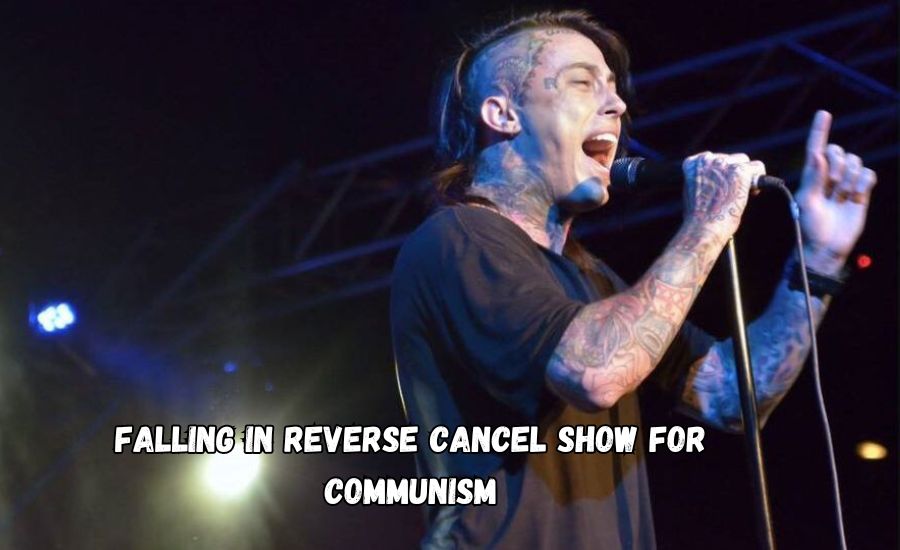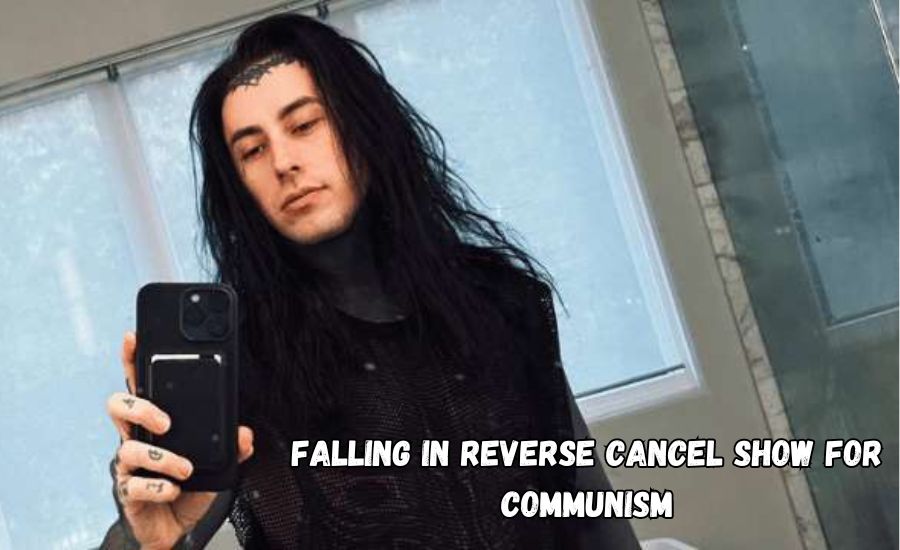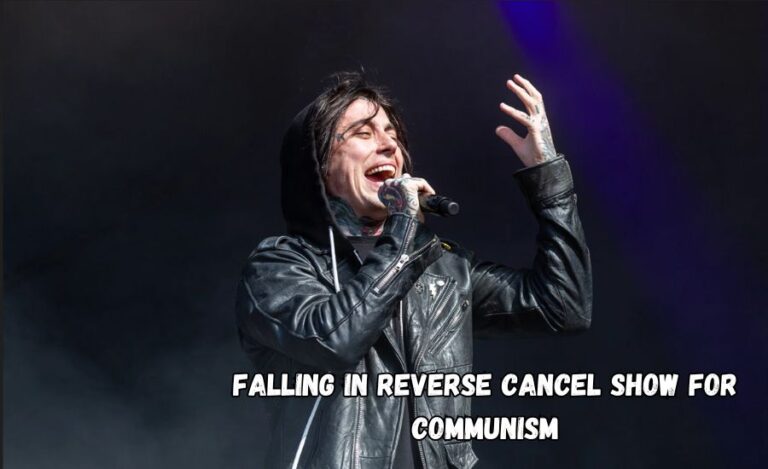Today, we at Dallas Insiders are exploring the topic of “Falling In Reverse cancel show for communism.” Recently, political views and the music industry have become increasingly intertwined, with musicians taking bold stances on social and political issues. One such incident that caught the attention of fans and the media alike is the decision by the popular band Falling In Reverse to cancel their show at a major festival, a move referred to as the “Falling In Reverse cancel the show for communism” controversy. This decision ignited debates across fan circles, social media, and among music critics as people weighed the band’s political motivations and their stance on corporate sponsorship.
Falling In Reverse, led by outspoken frontman Ronnie Radke, has always been a group known for pushing boundaries, both musically and ideologically. Radke’s decision to cancel the performance at Download Festival due to the involvement of the financial institution Barclays sparked considerable backlash. The band’s cancellation was linked to issues concerning capitalism and corporate exploitation, ultimately being dubbed an act in line with communism. This article delves deep into the incident, exploring the reasons behind the cancellation, the political ideologies, and its impact on fans and the broader music community.
The Download Festival and Corporate Sponsorship
The Download Festival is one of the most iconic rock and metal festivals, attracting thousands of fans yearly. For many musicians, performing at such a major event is a career milestone. However, the 2024 edition of the festival became mired in controversy when several bands, including Falling In Reverse, withdrew from the event. The cause of these cancellations was the festival’sfestival’s sponsorship by Barclays, a financial institution that has faced criticism for its involvement in controversial investments, including fossil fuels and arms manufacturing.
Scowl and SPEED, two other prominent bands on the festival’s roster, had already dropped out, citing concerns over Barclays’ business practices. However, the involvement of Falling In Reverse took the debate to another level, with Radke making his own political statement. While Scowl and SPEED focused on ethical issues regarding corporate greed and environmental damage, Radke’sRadke’s cancellation was framed within a broader ideological discussion involving capitalism, class struggle, and communism.
Ronnie Radke’s Stand Against Capitalism
Ronnie Radke, known for his unapologetic and often polarizing opinions, used this moment to express his frustrations with the larger capitalist system. His choice to pull Falling In Reverse from the festival was not merely an act of solidarity with the other bands. Still, it was part of a broader critique of the capitalist structures that dominate the music industry. Radke emphasized that his decision was influenced by his desire to stand against systems exploiting artists and the working class.
This act of protest quickly became associated with communism, as Radke’s rhetoric touched upon key themes central to communist ideology. Communism advocates for a classless society free from the oppressive influence of corporate and capitalist forces. By opposing Barclays’ involvement, Radke was, in essence, taking a stand against the concentration of wealth and power in the hands of a few.
The phrase “Falling In Reverse cancel show for communism” soon began to trend, as fans and commentators debated whether Radke’s move was a genuine political statement or an opportunistic attempt to draw attention. Regardless of the motivation, it was clear that the band’s cancellation struck a chord with a segment of the audience growing increasingly disillusioned with corporate influence in the music world.
The Role of Music in Political Activism

Throughout history, music has been a powerful tool for political activism. From the anti-establishment messages of punk rock to the protest songs of the 1960s, artists have used their platforms to challenge authority and fight for social change. Falling In Reverse’s decision to cancel their performance continues this tradition, positioning the band as advocates for a more ethical and just society.
The question of whether musicians should engage in political activism is a divisive one. On the one hand, artists are often seen as cultural leaders who can inspire and mobilize their audiences. On the other hand, some fans argue that music should be an escape from the harsh realities of the world, free from the intrusion of politics.
Ronnie Radke’s decision to cancel the show, ostensibly for communism, fits squarely within the tradition of politically motivated musicians. By refusing to perform at an event sponsored by a corporation with ties to questionable business practices, Radke was aligning himself with a long line of artists who have used their fame to promote progressive ideals. Whether or not fans agree with his stance, it is undeniable that the controversy has sparked a larger conversation about the role of corporate money in the music industry.
Fan Reactions: Divided Opinions
Not surprisingly, the announcement that Falling In Reverse would cancel their performance was met with mixed reactions. Some fans praised Radke for taking a stand against what they perceived as corporate greed, while others were disappointed that they would not get to see the band perform at such a major event.
Social media became a battleground for debate, with the hashtag #FallingInReverseCancelShowForCommunism trending as fans voiced their opinions. Supporters of Radke’s decision saw it as an act of integrity, a rare moment where an artist prioritized principles over profit. These fans felt that the band’s stance against capitalism resonated with the values of fairness and equality that many in the music community hold dear.
On the other side, detractors argued that Radke was overstepping his role as a musician by injecting politics into his music. Some fans simply wanted to enjoy the festival without being confronted with political messaging. Others accused Radke of virtue signaling, suggesting the cancellation was more about generating publicity than making a meaningful political statement.
The divide among fans highlights the ongoing tension between art and politics. While some believe that musicians must speak out on important issues, others feel that music should be an apolitical space where fans can escape the divisiveness of the world around them.
| Event Name | Falling in Reverse Cancel Show |
| Reason for Cancellation | Controversial statements or themes related to communism |
| Band Background | Falling in Reverse is a rock band known for their dynamic sound and thought-provoking lyrics. |
| Fan Reactions | Mixed responses; some fans supported the cancellation, while others were disappointed. |
| Public Statement | Band or management issued a statement explaining the reasons for the cancellation. |
| Impact on Tour | Cancellation affected the band’s overall tour schedule and potential revenue. |
| Media Coverage | Various news outlets and social media platforms covered the story, leading to extensive discussions. |
| Future Plans | Uncertain; the band may reconsider future shows or alter their approach to controversial topics. |
Corporate Sponsorship and Ethical Dilemmas
The Falling In Reverse cancel show for communism controversy also raises important questions about the role of corporate sponsorship in the music industry. Major music festivals like Download often rely on sponsorship from large corporations to fund their operations. However, when those sponsors engage in unethical business practices, it puts artists in a difficult position. Should musicians accept money from companies whose values they disagree with? Or should they refuse to participate in events funded by corporations with a history of exploitation?
This dilemma is becoming increasingly common as fans and artists demand more accountability from the corporations that fund their favorite events. In the case of Falling In Reverse, the decision to cancel the show was seen by many as a principled stand against the corrupting influence of corporate money in the music industry.
Also Read: Diyuehe
The Broader Political Context

The decision of Falling In Reverse to cancel their show for communism must also be understood within the broader context of political polarization. Around the world, political divides are deepening, and issues like climate change, income inequality, and corporate power are becoming increasingly urgent. Artists like Ronnie Radke find it harder to remain neutral in a world where staying silent is often seen as complicity.
Radke’s cancellation can be seen as part of a larger movement of artists using their platforms to push back against the dominance of corporations in the arts. By aligning themselves with anti-capitalist ideologies, these artists challenge the notion that art can exist independently of politics.
The Legacy of Falling In Reverse’s Decision
In the weeks following the cancellation, it became clear that the phrase “Falling In Reverse cancel show for communism” had become more than just a headline. It had taken on a life of its own, symbolizing the growing frustration many artists and fans feel toward corporate influence in the music world.
For Falling In Reverse, the decision to cancel their show will likely become a defining moment in their career. While it may have alienated some fans, it has also attracted a new audience of listeners who appreciate the band’s willingness to stand up for their beliefs. Radke’s outspoken nature has always been a part of the band’s identity, and this incident only solidifies their reputation as a band unafraid to court controversy.
Conclusion
The decision by Falling In Reverse to cancel their show for political reasons has sparked widespread debate about the role of artists in today’s polarized world. The “Falling In Reverse cancel show for communism” controversy has highlighted the ethical dilemmas that artists face when dealing with corporate sponsorship and the influence of capitalism on the arts.
Whether viewed as a bold political statement or a misguided disruption, the cancellation has left a lasting impact on the band and its fans. As the music industry grapples with issues of ethics, politics, and corporate control, Falling In Reverse’s decision may serve as a turning point in the ongoing conversation about the future of music and activism.
FAQs:
Q: Why did Falling In Reverse cancel their show?
A: Falling In Reverse canceled their show due to their objection to the festival’s sponsor, Barclays, over controversial business practices tied to capitalism, sparking the “Falling In Reverse cancel show for communism” controversy.
Q What is “Falling In Reverse cancel show for communism” means?
A: The phrase refers to the band’s political stance against corporate capitalism, aligning with anti-capitalist ideals in their decision to cancel the performance.
Q: How did fans react to the cancellation?
A: Fans were divided, some supporting the band’s political statement and others disappointed by the decision to cancel the highly anticipated performance.
Q: Was Ronnie Radke’s decision to cancel the show politically motivated?
A: Yes, Ronnie Radke expressed his stance against corporate influence and capitalism, leading to the cancellation as a form of protest.
Q: Has Falling In Reverse made similar political statements before?
A: While Falling In Reverse is known for being bold and outspoken, this particular cancellation brought their political views to the forefront in a more significant way.
Stay informed with the latest news and updates on Dallasinsiders.com
